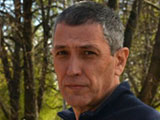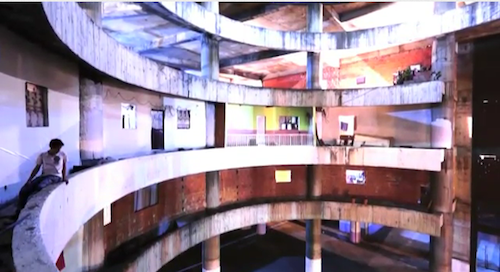David Versus Venice
by Israel Centeno / September 11, 2012 / 1 Comment
Caracas’s vertical shantytown is applauded in Venice
To believe in the innocence of the European or North American left when it demonstrates its sympathy for dictatorial and corrupt governments, such as those in Cuba or Venezuela, is to go along with their self-pitying and cynical game. As they tirelessly hang on to ideas about utopian society in places where they would not go a single day without hyperventilating, they never cease to amaze. Never going beyond their clichés, they are usually found at the forefront of movements like the liberation of the dispossessed, almost always at a distance from the cruelty of the world, surrounded by the comfort provided by the capitalist academic environment. Wrapped up in their nakedness, they safeguard their need to practice for and bet on “another” impossible revolution. Using colonialist judgment, they reward and applaud the barbarian that is vindicated before their eyes.

- From his lonely watch post Albert Camus asked who among us has not experienced exile yet still managed to preserve a spark of fire in their soul. “We’re all alone,” Natalia Sedova cried in exile on hearing of her husband Leon Trotsky’s affair with Frida Kahlo. In his novel Night Watch, Stephen Koch follows the incestuous love affair of David and Harriet, wealthy siblings watching the world from their solitary exile. Koch’s writing, Camus’s theories, and Trotsky’s affair all come back to exile and lead me to reflect on the human condition. From my own vantage point, my Night Watch, I will reflect on my questions of exile, writing, and the human condition.

- Israel Centeno was born in 1958 in Caracas, Venezuela, and currently lives in Pittsburgh as a Writer-in-Residence with City of Asylum/Pittsburgh. He writes both novels and short stories, and also works as an editor and professor of literature. He has published nine books in Venezuela and three in Spain.
Case in point: At the Venice Biennale, such “innocents” awarded the Golden Lion to the deformed embarrassment that is Venezuela’s Tower of David. In doing so they essentially rewarded Hugo Chávez’s vertical favela. However, the panel argued that it is not rewarding an occupation (they replace the word “invasion” with “occupation”), but rewarding the residents of Caracas and their families. With such a gesture, they say that they are trying to attract attention and get building firms to bring down the cost of social housing. They declare emphatically, practically crimson because of the joke that is the Venezuelan social justice system, that these poor people have made an abandoned commercial tower habitable and, oh, they were even able to build a water tank and hydroponic gardens. The “innocents” say this in a Venetian café that simulates Caracas—though without the effusion of blood and the omnipresent voice of Chávez—so that people can experience the tropical miracle at a safe distance.
Throughout this affair, there have been racist and derogatory intentions. The prize has not been awarded because of a solution to the housing problem, or because of a plan orchestrated to provide housing to the homeless. Instead it was awarded because of the inventiveness of invaders, promoted by the government, who made poverty look beautiful. They could make a silk purse out of a sow’s ear! According to them, a country with high income and a “popular” government has kept savagery under control. Oh là là! How magnificent the populist cosmetology. How surprising the demagogy of the panel in Venice.
We should make the way we’re killing each other in Caracas look beautiful: Choreograph the violence, convert it into 3D images to display in the café in Venice, and demonstrate the aesthetic value of murdering 60 people by using slow motion. They should give prizes for reinventing our hellish prisons and value the delightful inefficiency that led to the giant mushroom of fire, smoke, and death at the Amuay refinery. We should also reinvent extreme poverty to satisfy the panel’s ontological need for justice.
Maybe the homeless throughout Europe should move into palafitos in St Mark’s Square—or on the Champ de Mars—in a display of revolutionary creativity, and see whether the construction bourgeoisie writes off their debts.
No, no, no, no.
Why focus on improving the power that attacks the Italians, Greeks, and Spanish and flings them out on the streets, unemployed? Far away, in Venezuela, Ecuador, or any other distant country, cheerful people who dance the salsa perform the miracle of making poverty look beautiful for us. Bravo.
Translation: Kelly V. Harrison






One Comment on "David Versus Venice"
Bravo, Israel! This is all a disgrace. There are two important events about this issue this week in Caracas.